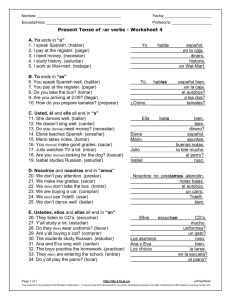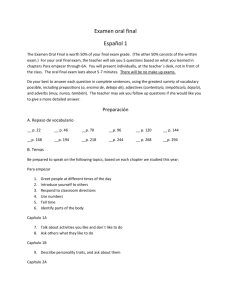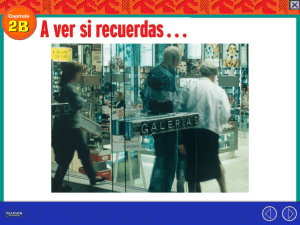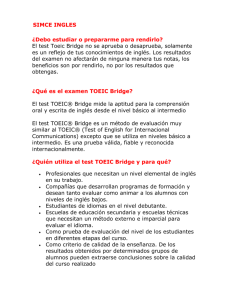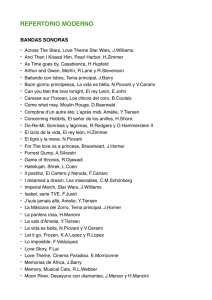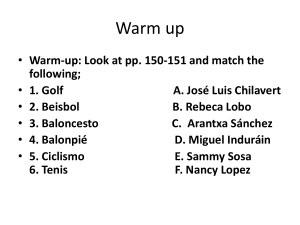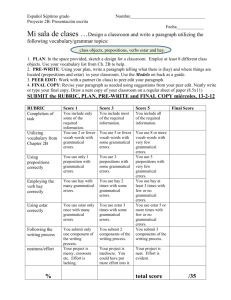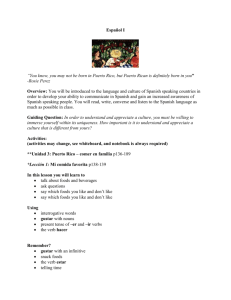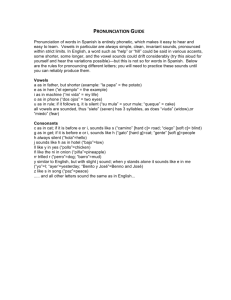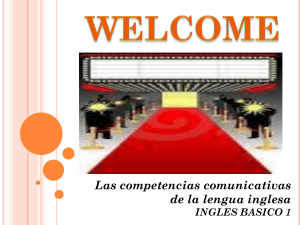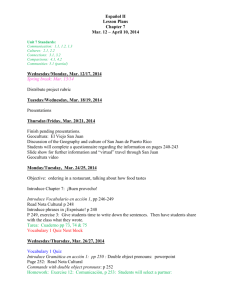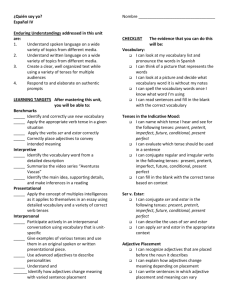CHAPTER 1 - Madison County Schools
advertisement
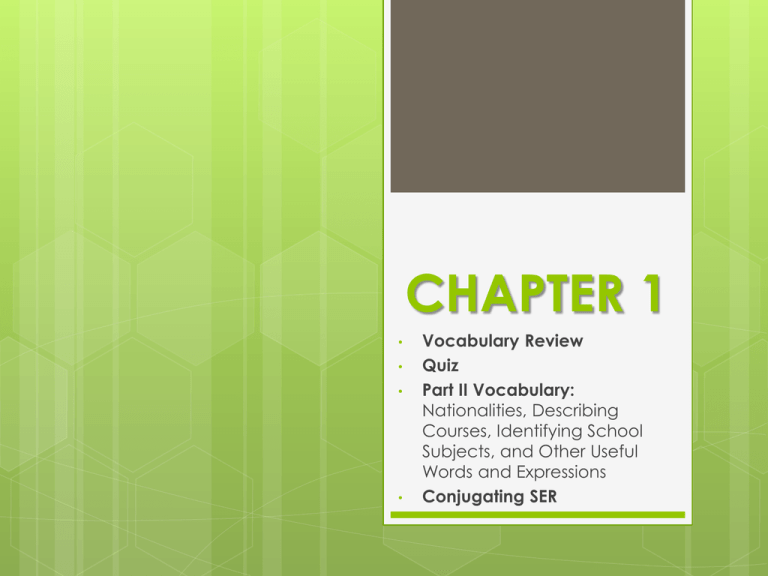
CHAPTER 1 • • • • Vocabulary Review Quiz Part II Vocabulary: Nationalities, Describing Courses, Identifying School Subjects, and Other Useful Words and Expressions Conjugating SER HAGA AHORA 3 de septiembre Secretly choose one person in the classroom. Write down as many adjectives as possible to describe that person. For example, if I were in class with Shakira, I would say, Ella es bonita. Ella es una muchacha simpática. VOCABULARY REVIEW! Slap that Palabra There will be several Spanish words (palabras) on the board. I will give you a vocabulary word in English, and you must locate and SLAP the correct word in Spanish. You will compete in pairs, so the person who slaps it first will get a point for their team! usted él ¿De dónde? cómico El joven ¿Cómo? La profesora yo ellos El muchacho La amiga ¿Quiénes? El alumno La muchacha tú ¿Qué? El curso nosotros La alumna ella La clase ¿Quién? El profesor ¿De qué nacionalidad? malo El muchacho pelirrojo El alumno perezoso La amiga buena El chico bajo El joven malo La amiga bonita La profesora simpática La muchacha baja La alumna ambiciosa La muchacha seria La chica morena La alumna inteligente El muchacho gracioso El muchacho rubio ¡PIZZARAS! We are going to practice writing the question words, adjectives, and subject pronouns you will see on your quiz! ¡PREPARATE PARA LA PRUEBA! PREPARE FOR THE QUIZ! Necesitan… 1. pencil 2. clean desk 3. backpack zipped up 4. NO PHONES. If its out during a quiz, I’ll assume you are cheating and give you a zero. You will be expected to locate and identify the capital for each Spanish-speaking country. We will break up the quiz into Central America and South America… This song is to help you remember the capitals of South American countries! NATIONALITIES IN SPANISH Chapter I Vocabulary: Part II Get out your vocabulary lists to fill in! argentino/argentina chileno/chilena colombiano/colombiana cubano/cubana dominicano/dominicana ecuatoriano/ecuatoriana guatemalteco/guatemalteca mexicano/mexicana norteamericano/norteamericana peruano/peruana puertorriqueño/puertorriqueña venezolano/venezolana Describing Classes and Courses Adjectives Una clase grande muchos alumnos pequeña no muchos alumnos These adjectives can describe more than just a class… Un muchacho grande Un perro pequeño Una clase interesante aburrida Un curso… difícil, duro fácil Identifying School Subjects: idiomas la ciencia la historia las matemáticas los estudios sociales la educación física el arte la música Other useful words and expressions… Secundario/a La escuela secundaria Nuevo/a La profesora nueva Mismo/a El chico mismo También “Yo también.” Bastante Whoopi Golberg es bastante fea. Muy “Muy bien.” Matthew Mc. es MUY guapo. Pero ¡Mucho gusto! ¡Oye! Alumnos, ¡OYE! María es una alumna nueva. Mucho gusto, María. 1. 2. 3. 4. 5. ¿Es grande o pequeña la clase de español? ¿Quién es la profesora de español? ¿Es interesante el curso de español? ¿Es fácil o difícil? ¿Son inteligentes los alumnos? GRAMÁTICA Adjetivos We Adjectives Words that describe nouns. have already learned SEVERAL adjectives in Spanish. guapo grande feo alta bueno cubano fácil We have also learned that adjectives must agree with the noun in GENDER. el muchacho guapo la muchacha bonita el alumno perezoso la clase pequeña Adjetivos must ALSO agree with the noun in NUMBER. Adjectives ending in –o el muchacho argentino los muchachos argentinos la muchacha argentina las muchachas argentinas Adjectives ending in –e el curso interesante los cursos interesantes la clase interesante las clases interesantes Adjectives ending in a consonant el curso fácil los cursos fáciles The pretty girl La The El The muchacha _______________ bad boy muchacho ________________ pretty girls Las The muchachas ______________ bad boys Los muchachos ______________ Describe las personas… Las muchachas ____________________ ¿Quiénes son? ¿Cómo son? Los chicos son ____________________. ¿Quiénes son? Con tu compañero… Práctica 6 Page 33 Both of you need to write it down. Check your answers… 1. 2. 3. 4. 5. 6. 7. La escuela no es pequeña. La escuela es grande. Las clases no son pequeñas. Las clases son grandes. Un curso es difícil. Y otro curso no es difícil; es fácil. Y otros cursos son difíciles. El verbo ser ser = to be In English… I am You are He/She/It is We are Y’all are They are Haga Ahora: 5/6 de septiembre La ___ de Elena es muy graciosa. a. escuela c. clase b. amiga d. alumna La profesora es de Ecuador. Ella es ___. a. ecuatoriana c.norteamericana b. mexicana d.peruana Ellos son ___ en la misma escuela. a. alumnos c. altos b. cursos d. muy ¿___ es el muchacho? Es Felipe. a. Cómo c.De qué nacionalidad b. De dónde d.Quién -Read the sentences. -WRITE THE WHOLE SENTENCE with the CORRECT answer filled in. Forms of ser yo nosotros/nosotras soy somos I am tú We are vosotros/vosotras eres sois You are él/ella/usted Y’all are ellos/ellas/ustedes es He/she/you(formal) are son They/y’all (formal) are yo nosotros/nosotras soy NOTE THAT: somos I am tú We are vosotros/vosotras eres sois You are él/ella/usted Y’all are ellos/ellas/ustedes es son He/she/you(formal) They/y’all (formal) are are The verb changes with EACH subject Since the verb is conjugated differently with each subject, the subject pronouns (yo, tú, ella, etc…) are often omitted (Yo) soy Shakira. (Nosotros) somos amigos. (Él) es guapo. Esta muchacha es Jennifer Lopez. Ella _______ muy bonita. Jennifer ______ de Nueva York pero ella ______ puertorriqueña. La actriz _____ muy ambiciosa y famosa. La familia ____ de Modern Family. Los muchachos y las chicas _____ muy famosos. Los actores ______ muy comicos. Jay _____ muy viejo pero Gloria ______ bastante joven. Use of “tú eres” Take turns describing your partner. Use the form “Tú eres ___________,” or just “Eres ____________.” Describe your partner in at least 3 sentences. Mexico City, Mexico Madison, Mississippi Es _________. Es _________. Son _________. Listen, Read, and translate Juan Fernando es un alumno colombiano. Él es de Bogotá, la capital de Colombia. Juan es moreno y es alto. Es muy serio. No es gracioso. Es un alumno muy bueno. Es alumno en el Colegio Simón Rodríguez. En Latinoamérica un colegio es una escuela secundaria. El Colegio Simón Rodríguez es una escuela muy buena. Juan es un amigo de Rosario. Rosaario no es colombiana. Ella es de Caracas, Venezuela. Rosario es rubia y es alta. Es muy graciosa. No es muy seria. Ella es alumna en el Colegio de los Andes. Es un colegio muy bueno. Complete with the correct form of ser. Tú ____________________ una amiga buena. ¿Usted ____________________ de Perú? Ustedes ____________________ muy cómicos. Nosotros ____________________ de Guatemala. Sandra y Roberto ____________________ alumnos muy serios. Complete with the correct article. ¿De dónde es ____________________ profesora? El español y el francés son ____________________ clases interesantes. ¿Quiénes son ____________________ muchachas inteligentes? Es ____________________ curso difícil. Soy ____________________ alumna ambiciosa. TAREA Finish Worksheet **Study for Vocabulary Quiz—next block!
